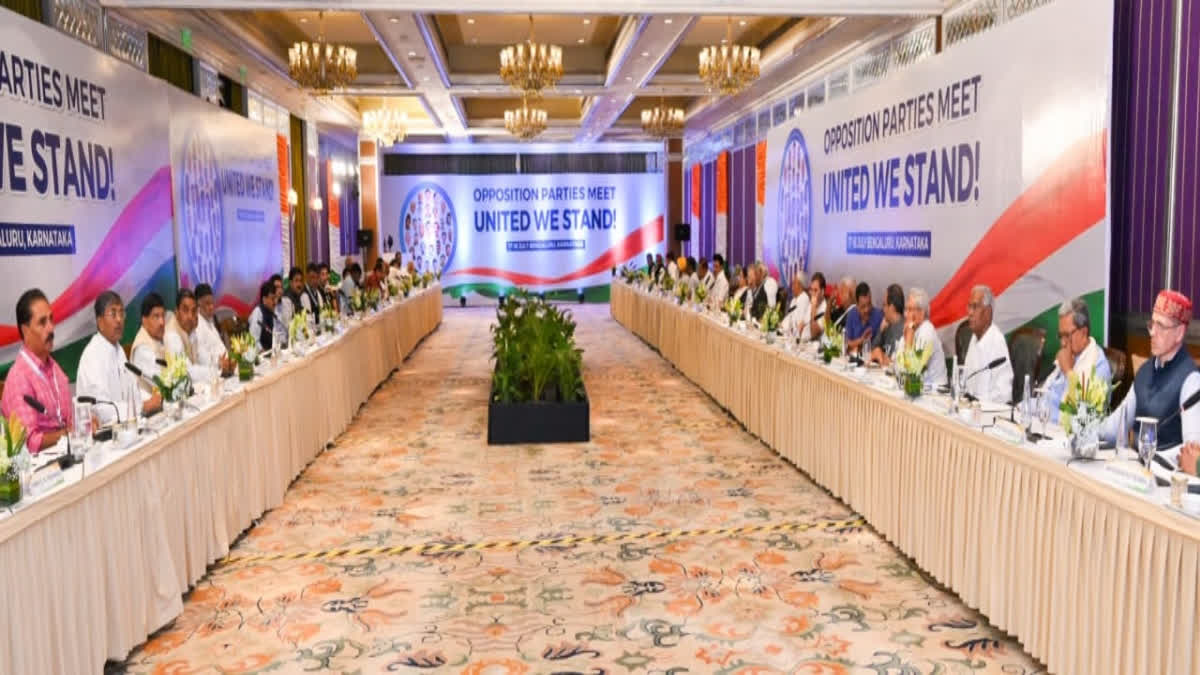Bengaluru: In a significant move towards forming a united front against the Bharatiya Janata Party (BJP), opposition parties convened for a crucial unity meeting on Tuesday. The primary objective of the meeting is to discuss and finalize various aspects, including a name, structure, common agenda, campaign program, and a roadmap for seat-sharing. With representatives from 26 parties expected to attend, the meeting held immense importance in shaping the future of opposition politics in India.
Prior to the meeting, top opposition leaders engaged in informal discussions on Monday. They also attended a dinner hosted by Karnataka Chief Minister Siddaramaiah from the Indian National Congress (INC). While the INC hinted that seat-sharing arrangements would require additional time, differences arose between the Trinamool Congress (TMC) and the Communist Party of India (Marxist) (CPI(M)) regarding the necessity of naming the alliance.
Despite these disagreements, the informal meeting and dinner were characterized by a sense of camaraderie among the attendees. However, the notable absence of Sharad Pawar, the Nationalist Congress Party (NCP) chief, raised eyebrows. The NCP announced Pawar's decision to skip the talks on Monday, but he assured his presence on Tuesday. Nevertheless, Pawar's meetings with NCP rebels who had aligned themselves with the BJP for the past two days further fuelled uncertainty surrounding the discussions.
Also read: Sonia-Mamata equation 'crucial' for forming anti-BJP alliance in 2024 Lok Sabha polls, say experts
During the dinner, UPA chairperson Sonia Gandhi shared a table with Mamata Banerjee, the chief of the TMC, and Arvind Kejriwal, the supremo of the Aam Aadmi Party (AAP). Mallikarjun Kharge, the president of the INC, completed the unlikely foursome. The interaction between Sonia and Mamata seemed to alleviate tensions between their respective party units in West Bengal. Previously, the Congress and TMC had clashed both electorally and physically during the state panchayat elections. Kejriwal, despite his ongoing verbal skirmishes with the Congress in Punjab and Delhi, where his party holds governments, also engaged warmly with Congress leaders.
The previous Opposition unity meeting in Patna on June 23 witnessed a heated exchange of words between Kejriwal and Congress leaders. However, the Congress's commitment to oppose an ordinance stripping the AAP government in Delhi of its powers seemed to have smoothed over any lingering disputes. Sonia's presence in Bengaluru, unlike her absence in Patna, was expected to further facilitate the process. Having fostered warm relationships across party lines during her tenure as the shepherd of the UPA coalition, Sonia's participation added a favourable dimension to the proceedings. The meeting was aptly themed "United We Stand," prominently displayed on banners, hoardings, and delegate passes.
- Seat sharing on the basis of the strength in the party in the state.
- Proposal for a new name of the alliance
- Structure of the opposition alliance
- EVM issues will be discussed and proposal will be given to the Election Commission of India
- Common minimum programme (CMP) to be discussed
- Campaign design
The agenda for Tuesday's meeting was presented by Kharge, inviting parties to offer their suggestions during the discussions. The agenda primarily focused on six proposals, including the establishment of subcommittees for drafting a common agenda and communication points for the alliance ahead of the 2024 general elections. Other key items on the agenda included devising a joint program for parties encompassing rallies, conventions, and agitations, determining seat-sharing arrangements on a state-by-state basis, suggesting a name for the alliance, establishing a common secretariat, and discussing electoral reforms related to electronic voting machines (EVMs) and the Election Commission.
A senior leader said that a major announcement might come during the opposition meeting on Tuesday. However, just hours before the gathering, the Congress cautioned that seat-sharing discussions might require additional time. Nevertheless, it asserted that the opposition meeting would be a "game changer" in Indian politics, providing a united front to address issues faced by the common people.
Also read: Bengaluru meet: Congress to project 'mass leader' Rahul Gandhi as opposition's PM candidate
CPI(M) General Secretary Sitaram Yechury indicated a potential point of contention by ruling out an alliance with the TMC in West Bengal. He emphasized that "secular parties," including the Left and Congress, would confront both the BJP and the TMC in the state. The Left, in particular, favored reaching state-wise understandings to minimize the division of opposition votes. However, left leaders also pushed for the finalization of a common program, the development of a political campaign centered around safeguarding democracy, the constitution, and secularism, and a mass action campaign focused on livelihood issues such as rising prices and unemployment.
The TMC purportedly advocated framing these initiatives as the identification of common issues and talking points rather than a traditional "common minimum program" as used by the Left. These differences of opinion reflected the complex dynamics at play within the opposition alliance, underscoring the challenges in forging a cohesive front against the ruling BJP.



